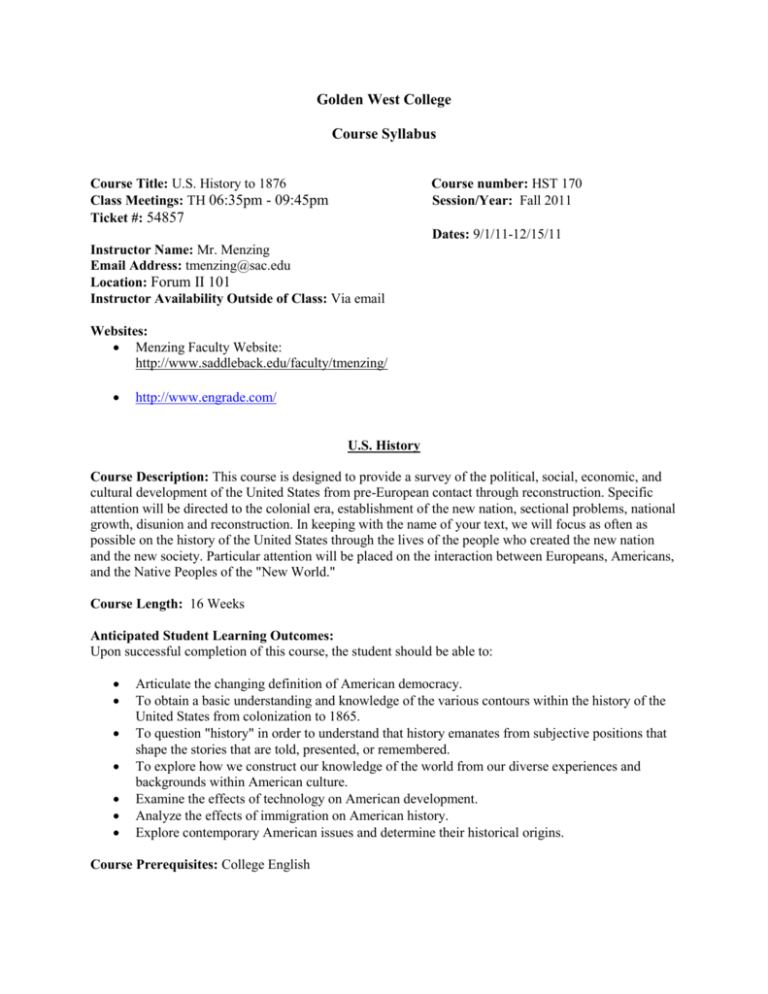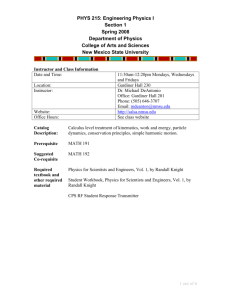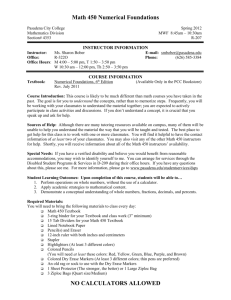Course Syllabus - Saddleback College
advertisement

Golden West College Course Syllabus Course Title: U.S. History to 1876 Class Meetings: TH 06:35pm - 09:45pm Ticket #: 54857 Course number: HST 170 Session/Year: Fall 2011 Dates: 9/1/11-12/15/11 Instructor Name: Mr. Menzing Email Address: tmenzing@sac.edu Location: Forum II 101 Instructor Availability Outside of Class: Via email Websites: Menzing Faculty Website: http://www.saddleback.edu/faculty/tmenzing/ http://www.engrade.com/ U.S. History Course Description: This course is designed to provide a survey of the political, social, economic, and cultural development of the United States from pre-European contact through reconstruction. Specific attention will be directed to the colonial era, establishment of the new nation, sectional problems, national growth, disunion and reconstruction. In keeping with the name of your text, we will focus as often as possible on the history of the United States through the lives of the people who created the new nation and the new society. Particular attention will be placed on the interaction between Europeans, Americans, and the Native Peoples of the "New World." Course Length: 16 Weeks Anticipated Student Learning Outcomes: Upon successful completion of this course, the student should be able to: Articulate the changing definition of American democracy. To obtain a basic understanding and knowledge of the various contours within the history of the United States from colonization to 1865. To question "history" in order to understand that history emanates from subjective positions that shape the stories that are told, presented, or remembered. To explore how we construct our knowledge of the world from our diverse experiences and backgrounds within American culture. Examine the effects of technology on American development. Analyze the effects of immigration on American history. Explore contemporary American issues and determine their historical origins. Course Prerequisites: College English Course Materials 1) Author : Nash Title : American People: Brief (v.1) Publisher : Longman Edition : 7th ISBN:9780205805396 Required 2) Author: Oats Title: The Fires of Jubilee ISBN: 9780060916701 Required Recommended Readings: None Method of Instruction: Lecture Estimated Homework Hours/Week : 3-4 Technology Needed: Access to a computer, word processing program, disks, and printer Grading Scale: A B C D F 100-90 80-89 70-79 60-69 60 or below Grades are never “rounded up.” A grade of 79.9 is a “C.” Unless there is a mathematical error, please do not ask the instructor to change a grade. Please note that the final grade is not based on a simple point system. The categories are weighted – The Final Exam category, for example, is worth more than the Quiz category. Process for Evaluation: 11 Quizzes (4% each) 4 Exams (11% Each) Essay 44% 44% 12% 100% Exams and quizzes are timed. There are no make-ups. Both quizzes and exams will start at 6:35 PM. Quizzes are broken into two halves. The first half will be from 6:35-7:00, the second half from 9:20-9:45 PM. Exams will begin at 6:35 and last one hour to 7:35. There will be about 60 multiple choice questions (timed at about 1 minute per question). Lecture will proceed after the quizzes and exams. I will provide Scantron forms, please bring #2 pencils with an eraser. Quizzes are short, usually about 25 questions based on the previous week’s readings and lecture. Quizzes will be broken into two halves. Exams are based on all material up to each respective exam. Exam 2, for example, covers all material since Exam 1, and so on. The essay is based on the Oats text, The Fires of Jubilee. The essay should be 4-5 pages in length, double spaced and typed. The essay must be submitted to Turnitin.com. Your essay will not be accepted if it contains more than five (5) spelling errors (so be sure to run your “spell check” program). Your thesis is completely up to you but if you want to know what your essay should “look like” (structure, citations etc) you should follow a basic MLA structure (introduction, thesis, body paragraphs, conclusion + parenthetical references to the text, e.g., (Oats, 47), (Nash, 65). This is a long text. You should begin reading the text the first week of class. Please submit your essays to http://turnitin.com/static/index.html, by 5/26/11. Late papers will not be accepted. Go to the New Users tab (upper right corner) and register (takes about a minute). Then simply type in the following codes: o o Class ID: 3452284 Password: Amistad The password is case sensitive. Also please note that the turnitin.com system is set to Mountain Time so you need to turn in your essay by 9:00 PM on 5/26 to be safe. The study guides are posted only to help students keep track of the lecture/discussion. They are not part of the grading system and do not need to be turned in. You can access the study guides at http://www.saddleback.edu/faculty/tmenzing/ Go to bottom link marked “GWC” Incomplete Grades: The instructor does not issue Incomplete grades. Homework and late assignments: Students must keep pace with the reading schedule Extra Credit Assignments: There is no extra credit Personal Responsibility Hst 170 is a transferable course within both the CSU and UC college systems. This course is a university-level survey of world history. This instructor does not believe in lowering academic standards because this is "just a community college course." On the contrary, the standard for this course is at a CSU/UC level. If students are not prepared to engage the course at this level they should consider dropping the course. Remember, as Cheech Marin once said: "Responsibility is a heavy responsibility" Please complete your readings and assignments on time. Due dates are clearly marked on the syllabus No late work will be accepted There are no make-up quizzes or exams Course Requirements NOTE: If you are no longer participating in the class it is your responsibility to drop or withdraw yourself from the course. It is not the instructor’s responsibility to drop students who are no longer participating in the class. Special Services “Special Services provides support services and specialized instruction for students with disabilities.” If you feel that you are in need of special services please contact the Special Services office Note: please feel free to discuss special services issues with me. If you have already been assessed through Student Services please discuss accommodations with me and get the paperwork to me as soon as possible. This course meets the requirements set forth in the accessibility checklist and universal design grid provided by special services. The Web pages, video presentations, textbooks and class materials used in this course are accessible to students with disabilities. Grading Criteria for Writing Assignments: Please note that grading is an inherently subjective process. The instructor uses the following rubric to help determine grades on discussion forums and essays. The instructor reserves the exclusive right to determine grading thresholds. The instructor will never “negotiate” grades. "A" range work is: Outstanding achievement; significantly exceeds standards. Unique topic or unique treatment of topic; takes risks with content; fresh approach. Sophisticated/exceptional use of examples. Original and "fluid" organization; all sentences and paragraphs contribute; sophisticated transitions between paragraphs. Integration of quotations and citations is sophisticated and highlights the author's argument. Confidence in use of standard English; language reflects a practiced and/or refined. Posts also effectively integrate all of the course resources (Pesci and Nash) with proper in-text citations. "B" range work is: Commendable achievement; exceeds minimum standards. Specific, original focus; content well-handled. Significance of content is clearly conveyed; good use of examples; sufficient support exists in all key areas. Has effective shape (organization); effective pacing between sentences or paragraphs. Quotations and citations are integrated into argument to enhance the flow of ideas. Have competent transitions between all sentences and paragraphs. Conveys a strong understanding of standard English; the writer is clear in his/her attempt to articulate main points, but may demonstrate moments of "flat" or unrefined language. The work contains very few mechanical errors. Posts also integrate at least two of the course resources. "C" range work is: Acceptable achievement; meets minimum standards for course. Retains over-all focus; generally solid command of subject matter. Subject matter well explored but may show signs of underdevelopment. Significance is understood; competent use of examples. Structure is solid, but an occasional sentence or paragraph may lack focus. Quotations and citations are integrated into argument and references are provided. Transitions between paragraphs occur but may lack originality. Competent use of language; sentences are solid but may lack development, refinement, style. Occasional minor mechanical errors may occur, but do not impede clear understanding of material. The work contains few serious grammatical or spelling errors. understanding of syntax and usage. Sentences vary in structure; very few if any mechanical errors. Posts also effectively integrate at least one of the course resources. "D" range work is: Marginal in achievement; it fails to not meet minimum standards. Significance of content is unclear. Some ideas may lack support, elaboration. Lacks sufficient examples or relevance of examples may be unclear. Support material may not be clearly incorporated into argument. Expression is occasionally awkward (problematic sentence structure). Mechanical errors may at times impede clear understanding of material. May have a few serious mechanical errors. Posts do not integrate any of the course resources. “F" range work: Ignores assignment. Lacks significance. Lacks coherence. Lacks focus. Difficult to follow due to awkward sentence or paragraph development. Mechanical errors impede understanding. Problems with writing at the college level. Any work that is plagiarized. Academic Dishonesty Students are expected to maintain the highest standards of academic honesty while pursuing their studies at Golden West College. Academic dishonesty includes but is not limited to: plagiarism and cheating, misuse of academic resources or facilities, and misuse of computer software, data, equipment or networks. Plagiarism is the use (copying) of another person’s ideas, words, visual images, or audio samples, presented in a manner that makes the work appear to be the student’s original creation. All work that is not the student’s original creation, or any idea or fact that is not “common knowledge,” must be documented properly to avoid even accidental infractions of the honor code. Cheating is to gain an unfair advantage on a grade by deception, fraud, or breaking the rules set forth by the instructor of the class. Cheating may include but is not limited to: copying the work of others; using notes or other materials when unauthorized; communicating to others during an exam; and any other unfair advantage as determined by the instructor. Students who cheat and/or plagiarize will receive a score of zero for the particular assignment). Also, students who violate the terms of academic honesty will have an Academic Dishonesty Report filed with the Dean’s Office. ------------------------------------------------------------------------------------------------------------------------------Week 1 (9/1) Three Worlds Meet Introduction and Orientation READ: Nash, chapters 1-2 Ancient America and Africa & Europeans and Africans Reach the Americas FILM: 500 Nations & Middle Passage (from Amistad) Week 2 (9/8) Servitude, Slavery, and the Growth of the Southern Colonies READ: Nash, chapter 3 Colonizing a Continent in the 17th Century FILM: 500 Nations Quiz 2 Week 3 (9/15) The Maturing of Colonial Society READ: Nash, chapter 4 The Maturing of Colonial Society FILM: 500 Nations Quiz 3 Week 4 (9/22) Bursting the Colonial Bonds READ: Nash, chapter 5 Bursting the Colonial Bonds EXAM 1 Week 5 (9/29) A People in Revolution READ: Nash, chapter 6 A People in Revolution FILM: 500 Nations & The People Speak QUIZ 4 Week 6 (10/6) Consolidating the Revolution READ: Nash, chapter 7 Consolidating the Revolution FILM: ? QUIZ 5 Week 7 (10/13) Creating a Nation READ: Nash, 7 Consolidating the Revolution FILM: 500 Nations QUIZ 6 Week 8 (10/20) Society and Politics in the Early Republic READ: Nash, 8 Currents of Change in the Northeast and Old Northwest EXAM 2 Week 9 (10/27) The Market Revolution READ: Nash, 8 Currents of Change in the Northeast and Old Northwest FILM: Daughters of Free Men QUIZ 7 Week 10 (11/3) Slavery and the Old South READ: Nash, 9 Slavery and the Old South FILM: Doing as they Can QUIZ 8 Week 11 (11/10) Shaping America in the Antebellum Age READ: Nash, 10 Shaping America in the Antebellum Age FILM: ? QUIZ 9 Week 12 (11/17) Moving West READ: Nash, 11 Moving West VIEW: San Patricios EXAM 3 Week 13 (11/24) THANKSGIVING HOLIDAY Week 14 (12/1) The Union in Peril READ: Nash, 12 The Union in Peril FILM: John Brown’s Holy War QUIZ 10 Week 15 (12/8) The Union Severed Read: Nash, 13 The Union Severed FILM: The Civil War QUIZ 11 Week 16 (12/15) FINAL EXAM ESSAY DUE (Turnitin.com – Due 12/15)








